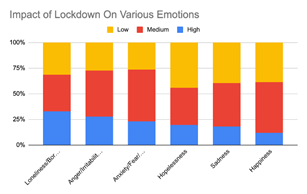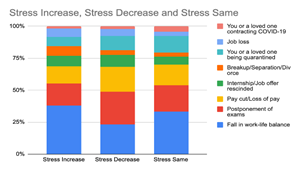Though staying at home is the safe option during this Covid-19 pandemic, not everyone can do so, as many people feel stressed pondering over the future, job insecurity and the fear of the coronovirus pandemic itself.
A survey conducted across 8,396 individuals revealed that almost 65% of them were feeling stressed because of the pandemic, and 33% reported to feel high to extreme levels of stress.
The Mental Health Survey, which was conducted by online emotional and mental wellness platform YourDOST, revealed that when the nationwide lockdown had just started, 33% of respondents experienced ‘extreme to high stress’, 65% of respondents report ‘moderate to mild stress’ while 16% did not experience stress. However, these stress levels rose significantly as the lockdown period got more and more extended with 55.3% of the respondents reporting an increase in their stress.
Headquartered in Bengaluru, YourDOST is an emotional wellness platform which provides access to experts and self-help tools. With over 900 experts on the platform, users can reach out to them 24×7, anonymously for guidance related to COVID-19 related anxiety, relationships, career, academics, sexual wellness, self-improvement and more. Founded by Puneet Manuja, an IIM- Bangalore alumnus and Richa Singh, an IIT-Guwahati alumna in 2015, YourDOST has so far impacted over two million lives in India.
The survey found that falling back on friends and family by way of being able to speak with them more frequently is the most preferred coping mechanism for the respondents, while exercising more frequently, reduction in consumption of news and social media usage helped them also found favour as other options. However, entrepreneurs and self-employed relied on exercising more to help them reduce stress levels.
The survey was conducted in two phases – at the early implementation of the lockdown and after the lifting of lockdown across most states. Overall, the study incorporated insights from 8,396 people. Responses were taken from 1,196 people (560 during the lockdown 1.0 and 636 post lifting of lockdown) for conducting the survey and compiled the data to see how the stress levels and mental emotions are impacting human lifestyles. The insights were further combined with inputs from 7,000 unique individuals who have undergone counselling sessions during the period of April – July 2020. Additionally, over 50 psychologists, counselors, psychotherapists and coaches were interviewed to understand the kind of cases they have been observing in their respective practices during the lockdown period.
The survey covered both male and female individuals residing in Tier -I, Tier-II and Tier-III cities aged between 17 and 90 years and comprised a mix of college students, working professionals, entrepreneurs, self-employed individuals, housewives, unemployed individuals and retirees.
As per the survey, loneliness or boredom followed by anxiety and anger were the top three emotions which impacted Indians the most during the lockdown. Biggest reason for ballooning of these emotions was uncertainty of when this lockdown or pandemic would end and when they can see normalcy again. Key reasons why the pandemic has been making people more stressed among the other key factors are health concerns and its impact on their job security.
YourDOST Co-Founder and COO Puneet Manuja said, “People across the globe are going through the most difficult phase of their lives. The impact of pandemic has led to untold and unforeseen uncertainties. Feelings of loneliness, stress & anxiety and hopelessness are dominant responses to the situation. However, people are also figuring out various coping mechanisms and are reaching out, exercising more, avoiding stimulations that are not helping them remain positive and also turning to meditation.”
“We are witnessing a spike in traffic to our platform compared to the normal conditions indicating that their awareness levels related to the importance of being mentally and emotionally fit have also risen,” Puneet Manuja said.
The survey clearly indicated that the sleep was the most affected activity due to the excessive stress levels during the lockdown and this followed by productivity and diet, overeating or undereating amongst the top impacts.
Experts suggest that to deal with the situation, speaking with family members and friends would help. Exercising and reducing news consumption (currently full of negativity) will aid combat stress. Stress levels have gone up by 55% compared to the initial lockdown. A fall in Work life balance has become the most common reason for the increase in stress levels during the lockdown period.
Although no longer under lockdown, the people are still not feeling comfortable to step out and meet other people fearing that they might get infected or others might not be willing to meet them. Anxiety, stress are the most common issues for which people are reaching out for counselling support. The number of sessions in the last three months of lockdown (March to June) was doubled due to the similar reasons.








